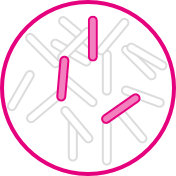Cultivation and characterization of IBD-relevant microbes

Introduction
Changes in microbiota compositions have been well investigated in healthy and diseased IBD patients on a genetic basis. The composition of the gut microbiota and the microbiome function are influenced by external stimuli such as nutrient availability, pH, or oxygen. To date, it is largely unknown how functional profiles change in single members of the microbiota and complete bacterial communities at IBD initiation, progression and during therapeutic interventions. Defining detailed metabolite and protein profiles and gaining knowledge about bioactivities of specific molecules in their direct interaction with the host within bacterial communities is a pre-requisite for a better functional understanding of the gut microbiome in the context of IBD.

Aims
To improve the understanding of the functional relevance of microbiota changes in IBD patients upon disease initiation, progression and treatment responses, we aim
- To correlate the molecular patterns of single bacterial isolates with their (either beneficial or nonbeneficial) role in IBD
- To decipher the molecular potential of single microorganisms altered in the presence of other bacteria (co-cultures), which molecular processes trigger the interactions
- To elucidate the interaction with the host is mediated for single bacteria, and to identify how is this how this is interaction is triggered in bacterial communities?

Outlook
In depth understanding of central metabolic and molecular factors that derive from SBIs from healthy and diseased IBD patients is crucial for optimizing diagnostic and therapeutic workflows. By pertubation of defined environmental forces a better characterization of the plasticity of the classical culturomics approach is expected.
Researchers
Other important members of P8
- N.N. (MTA, support for extensive cultivation of SBIs/ bacterial communities)
- Dr. Simon Graspeuntner (PostDoc, supervision of the culturomics techniques and maintenance of the in silico prediction analyses)
- Britta Steer (MTA, support for proteomics sample preparation)
- Dr. Christian Treitz (LC-MS systems’ maintenance, support and method development supervision of the proteomics experiments)





